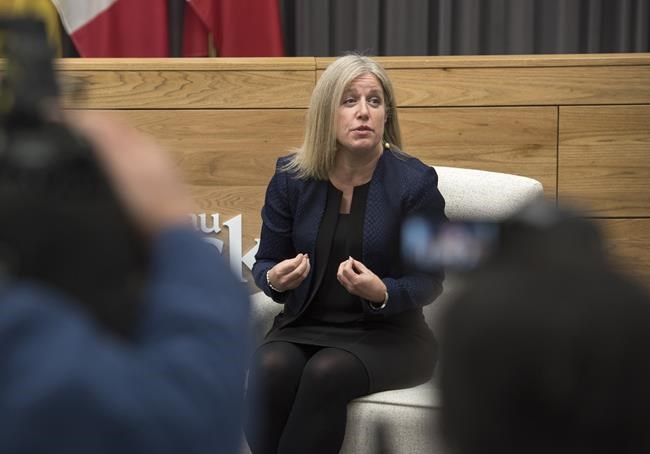New Brunswick Liberal government reverses changes to school gender identity policy
By The Canadian Press on December 19, 2024.
 New Brunswick Premier Susan Holt has followed through on election campaign pledge to reverse the previous government's changes to the province's policy on sexual orientation and gender identity in schools. Holt answers media questions in Fredericton, Tuesday, Nov. 12, 2024. THE CANADIAN PRESS/Stephen MacGillivray
New Brunswick Premier Susan Holt has followed through on election campaign pledge to reverse the previous government's changes to the province's policy on sexual orientation and gender identity in schools. Holt answers media questions in Fredericton, Tuesday, Nov. 12, 2024. THE CANADIAN PRESS/Stephen MacGillivrayFREDERICTON – New Brunswick Premier Susan Holt has followed through on a campaign pledge to reverse policy changes by the previous government concerning sexual orientation and gender identity in schools.
Holt issued a statement today saying her recently elected Liberal government has revised Policy 713 to incorporate recommendations from the province’s child and youth advocate, as well as input from students, families and the LGBTQ+ community.
Under the updated policy, transgender and non-binary students do not need parental consent to use their preferred names and pronouns in informal settings at school – such as when being addressed by peers or teachers. Students under 16 still require parental consent to change their names on official school records or on report cards.
In June 2023, the Progressive Conservative government led by former premier Blaine Higgs announced that students under 16 who were exploring their gender identity would require parental consent before teachers could use different first names or pronouns to address them.
Two months later, the province’s child and youth advocate, Kelly Lamrock, said forcing non-binary and transgender students to use a name they don’t identify with would violate their Charter rights.
The revised policy, to take effect Jan. 1, says students under 16 will be allowed to determine how their chosen first name and pronouns will be used in school, stipulating that parental awareness is encouraged but not required.
Education Minister Claire Johnson told reporters the new changes are an attempt to find a “sweet spot” between the original policy created in 2020 and the recommendations from the province’s child and youth advocate’s report to “set a tone of transparency and dialogue.”
“We really wanted to make it explicit and obvious that we want to involve parents and families as much as possible,” Johnson said, adding the policy will strive towards finding a way to open a dialogue between schools and children if a student feels comfortable sharing their identity at home.
Johnson said the way schools approachconversations between parents and teachers, if the student gives consent to share their identity with their family, will be determined on a case-by-case basis.
Another change is students will now have “the right and presumed capacity to self-identify” and make known their chosen first name and pronouns. There was no mention of a student’s capacity to self-identify under the former policy.
The revised policy also says there’s an expectation that families will be fully aware of such choices, but when a student is uncomfortable providing consent from their parents, “the school will respect the student’s wishes and work with them to create a support plan to make their parent(s) aware when they are ready.”
Johnson added there will be more training for teachers on how to talk to students who may be reluctant to inform their parents. “Our priority is absolutely to make sure the child is safe and secure,” she said.
This report by The Canadian Press was first published Dec. 19, 2024.
– By Cassidy McMackon in Halifax.
15-14


